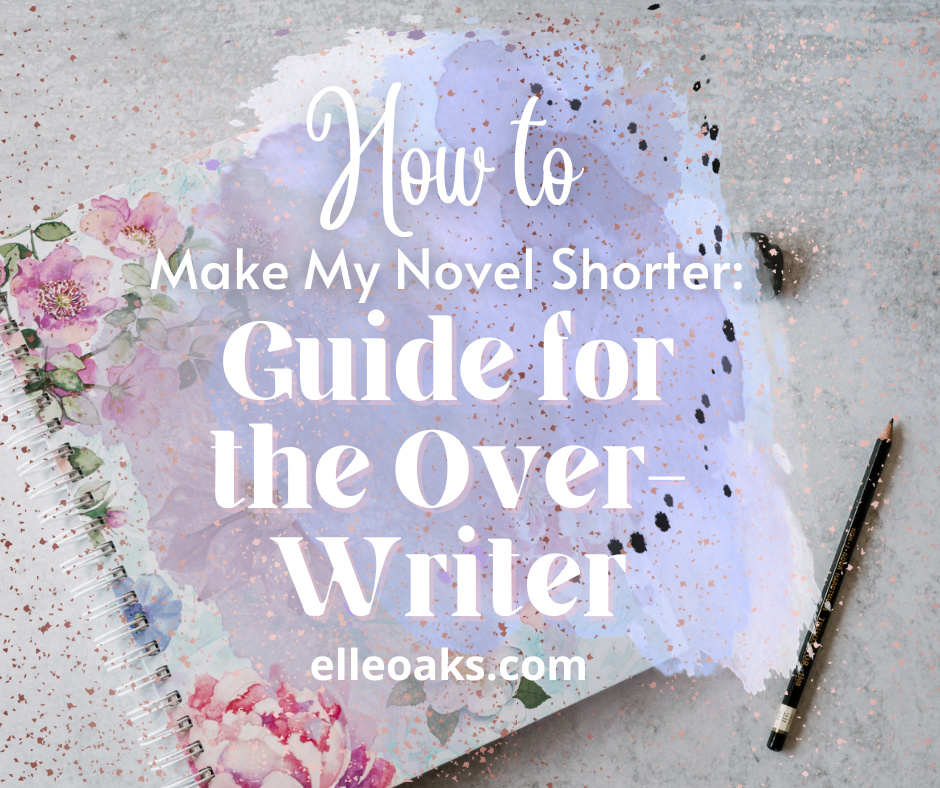Do you wonder how to cut through the fluff of your novel to get to the meat of the story? Do you feel like you’re writing and writing and the story’s not getting anywhere? You may be an over-writer. Below we’ll look at tips to cutting down the word count and improving overall storytell-a-bility!

Readers expect novels in certain genres to meet certain expectations. One of those expectations is length. Fantasy books are often longer than romance. Sci-Fi longer than horror. The target audience also needs considered. A middle grade novel should not be longer than an adult novel. Whether looking to traditionally publishing or self-publishing the expected page length range (available on the web) creates a guide for writers to follow.
But why does it matter?
Like mentioned, readers and publishers have expectations. Genres like fantasy and sci-fi are expected to be longer due to the worldbuilding involved. Word count can hint at whether a novel has true substance or whether it will be over before it’s started.
A book that is much longer than expected can hint at a couple of things to the reader.
- The writer wasn’t able to focus on central points and conflicts in the story.
- The story was not properly edited.
No one wants the audience to think your novel skipped a developmental edit (whether it did or not is none of my concern!). You also don’t want the reader to DNF (means “did not finish”) the book because they felt the story dragged on without going anywhere.
Here’s some tips on how to fix that.
Cut the fluff
Every line needs to add to one or more of the following:
- Worldbuilding
- Plot
- Character Development
If you’ve just spent the last paragraph talking about a dream the character had that doesn’t lend to the story at all, consider removing that paragraph. If you just spent 3 pages explaining step by step the protagonist cooking their breakfast and it does not further the novel at all, you probably could have summed it up in two lines. If your reader doesn’t need to know about it, just cut it out.
Repetitive or Excessive Description
I love Tolkien. And as a Tolkien fan I will say that The Lord of the Rings had excessive description. There is imagery and there is dumping adjectives on the page like you’re making money for adjective count. Too little description and it’s hard for the reader to see the world as you do. Too much, well, now the reader is totally confused and probably not interested in trying to make sense of it all.
Also, if you introduced a character, setting, or other concept in your novel, there is no need to formulate a paragraph at every reoccurrence. Yes, I get that they have icy blue eyes that glitter in the stars and have the depth of an ocean. Okay, I understand that the mossy cobblestone of the town was littered with this and that and this and that and this and that….. I get it. You may have found a thesaurus and switched up some words so it’s not exactly the same. But it is. It is the same. And it’s not necessary.
Filler words
Filler words are words that add no content to the novel. They take up prime real estate. They need to go. You may actually be shocked at how many filler words are in your novel. While in the document, do the search + F function to test it out. Search any of the below terms:
- That
- Just
- Very
- Feel
- Seem
- Really
There are other words, but you get the point.
Cutting filler words can also be just switching passive voice to active voice. For example:
I was attacked by the dragon.
To:
The dragon attacked me.
Six words down to four. Some instances will cut more words and changing to active voice already is an improvement!
Outline
You need to keep your ideas focused instead of straying too far off the path. To help, I recommend outlining your novel. This way you’ll know the beats before they happen and they can keep you on course.
A way to help you on your writing journey is to outline those ideas while they’re fresh. While you’re here, check out our new Story Outline Journals in our Amazon store.

Conclusion
So if you find that your novel far surpasses the expected range for a novel with a certain target audience and genre, follow some of these steps in your edits to make your novel clear and concise. Your reader will appreciate it and you’ll improve your writing in the process. The more you know to look out for the above, the better your next novels will draft as well.
Did I miss something? Let me know in the comments below what you think are the best tips to cutting down word count!
Like this post? Share on your socials!
Questions or ideas about future posts? Contact us on our form! Click here.

